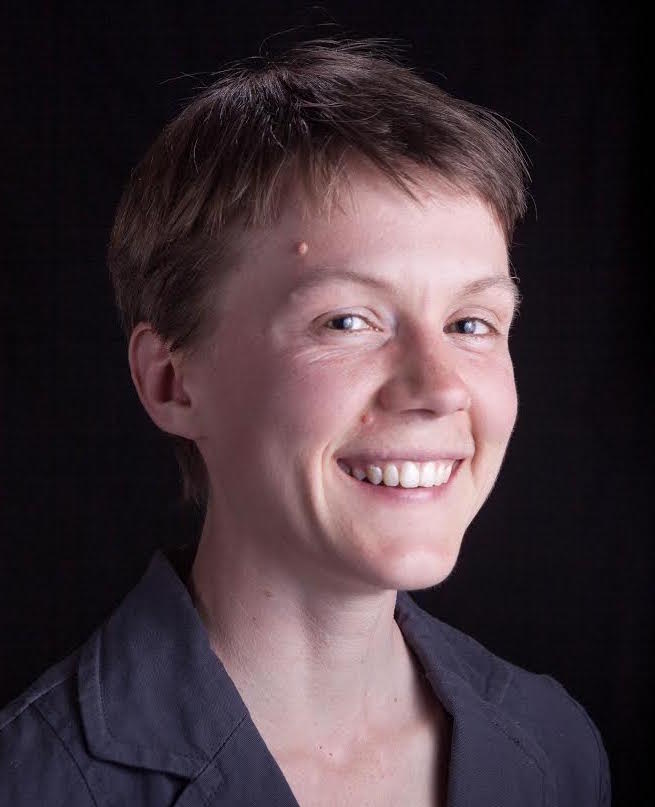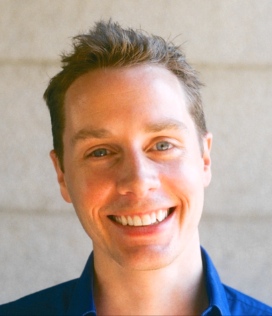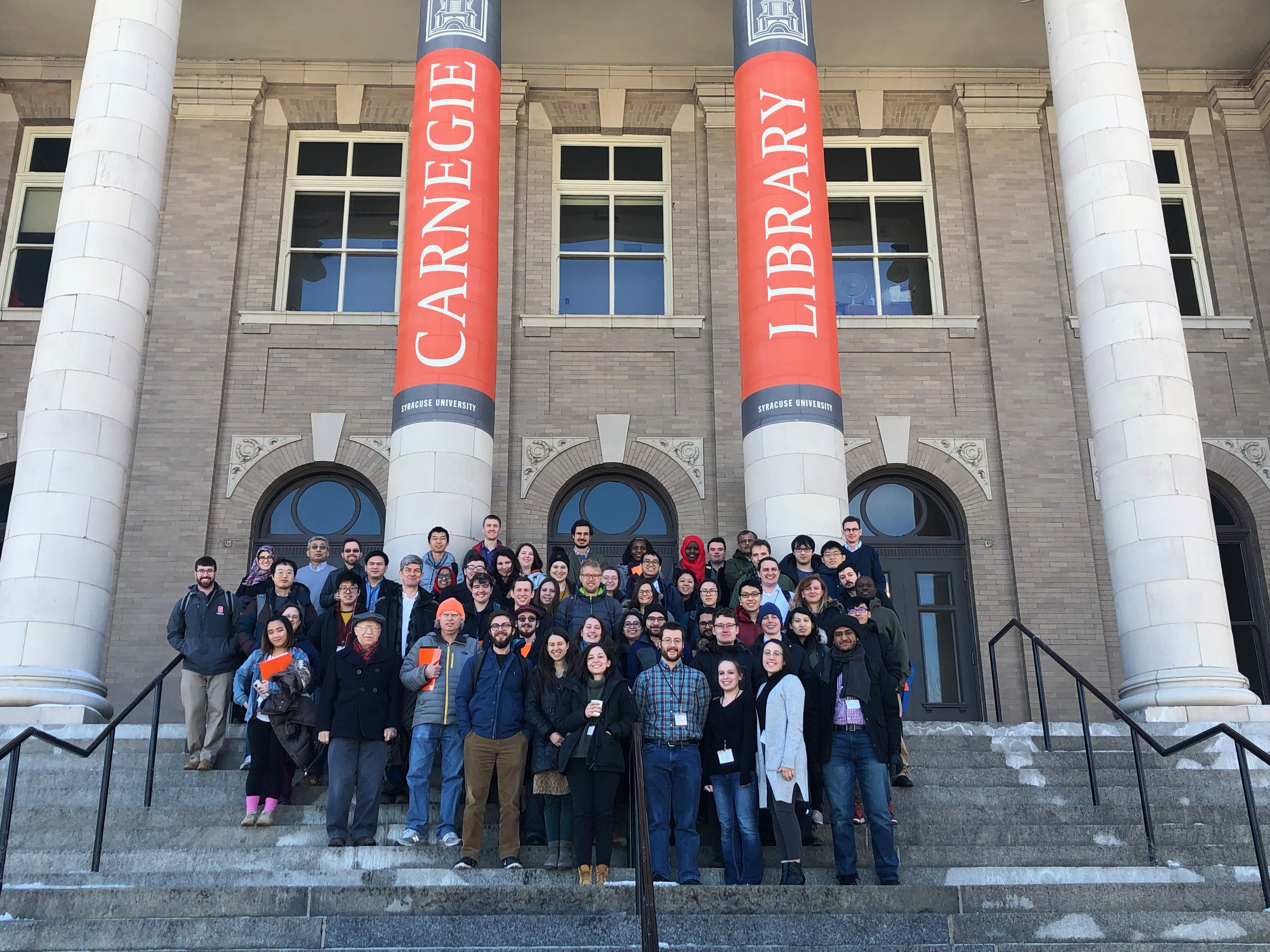44th Annual New York State Regional Graduate Mathematics Conference
Date: Saturday March 23, 2019 8:30am
Contents
About the Conference
The Annual New York State Regional Graduate Mathematics Conference (ANYSRGMC) is the longest running graduate mathematics conference in the country, and is organized entirely by graduate students. ANYSRGMC is a Mathematics conference dedicated to providing an opportunity for mathematics graduate students in any field to present their research or give an expository talk. The ANYSRGMC allows students from many fields and schools, who normally are not given a chance to interact, an opportunity to come together and explore a wide variety of mathematical topics simultaneously. Students have a unique chance to explore their interests, gain new insights across fields, and explore possible cross-disciplinary collaborative efforts. This is a unique opportunity for beginning graduate students to see a broad range of current mathematical research simultaneously and explore their interests. Though the focus of ANYSRGMC is on graduate students, advanced high school students or undergraduates, post-docs, and professors are welcome to attend and give talks. It is our goal to develop careers, broaden horizons, and engage the mathematics community at large. We hope to see you at the conference!
Conference Registration & Funding
You may register for the 44th Annual New York State Regional Graduate Mathematics Conference at this link or using the link below. Funding has been made possible by the National Science Foundation (NSF). The conference will make every effort to cover as much of the expenses for conference participants as possible. Underrepresented groups in Mathematics are especially encouraged to apply for funding. The conference will not book your hotel room past March 11. If you book your own hotel room beyond this, you may still be reimbursed for your hotel costs. However should you require funding in order to attend the conference, do not make any arrangements until you are sure you will have sufficient support; there is no guarantee that anyone applying for funding will receive any support. Registration is open until the day of the conference; however if you plan on giving a talk, you must submit your title and abstract by 12:00pm March 18, 2019. If the deadline has passed but you wish to give a talk, please, contact the organizers to check if arrangements can be made.
Date, Location, & Format
The 44th Annual New York State Regional Graduate Mathematics Conference will be held on Saturday March 23, 2019 in Carnegie Library at Syracuse University. This conference is supported by the Graduate Student Organization at Syracuse University and the American Mathematical Society. You can find Carnegie Library on Google maps at this link. The Syracuse University campus map is at this link.
The conference consists of two plenary talks and around 30 graduate student talks given in parallel sessions. All graduate students at any stage of their graduate education are welcome and encouraged to give a 20-25 minute talk. Talks may be expository or on the student’s research.
Hotel & Parking
We recommend staying at the Sheraton Syracuse University Hotel & Conference Center, which is located right on campus just a short walk to Carnegie Library. The Sheraton offers shuttles to/from Syracuse International Airport for those that may be flying. Guests at the hotel may park in the park in the parking garage right next to the hotel. Many conference attendees have been booked at the Parkview Hotel in Syracuse. You can find directions from this hotel to the conference hall at this link. The Parkview should also have options for shuttles from the hotel to campus.
There are a number of parking garages and other options on campus. For the conference, you may park in lots Q3 and Q4 near Carnegie Library. The lots adjacent to Carnegie will not be available due to construction. If you do not park in these lots, we recommend the University Avenue Garage, Irving Avenue Garage, or Booth Garage, all of which are a short walk to Carnegie Library. You can find all lot details at this link, and lot rates at this link. Of course, one can cheaply take an Uber or Lfyt to travel about Syracuse.
Conference Lunch/Dinners
‘Unofficial’ Dinner: Friday 6pm Wolff’s Biergarten
Conference Lunch: Saturday 12:45pm Carnegie Library (Free to attendees)
Official Conference Dinner: Saturday 6pm Inn Complete (Free to attendees)
There will be two conference dinners. On Friday March 22, starting at 6pm, there will be an ‘unofficial’ conference dinner. This will be at Wolff’s Biergarten, a German pub, in downtown Syracuse. For those with peanut allergies, note that they do have open peanut shells in the building. Some food may be provided. But this will be primarily for those interested in going to meet conference participants and many of the Syracuse University hosts in a casual environment. Biergarten does allow food to be ordered and delivered to their establishment. If you are at the Sheraton, directions can be found at this link while if you are at the Parkview you can find directions at this link.
The official conference dinner will take place at the Inn Complete, a ‘graduate student’ bar on south campus. The dinner will begin at 6pm and end by 10pm. There are busses which leave from College Place right by the conference hall. Also, there are bus options nearby any of the hotels to go to the Inn Complete. Food and drinks will be provided and there is a cash bar available. Parking is available for free there. There will be plenty of rides available for those that need a lift. Of course, one could also use Uber or Lfyt as transportation options.
Keynote Speakers
Dr. Kathryn Mann (Brown University)

Professor Kathryn Mann received her Ph.D. at the University of Chicago under Professor Benson Farb. Dr. Mann then was a postdoctoral research fellow at MSRI, followed by being the Morrey Visiting Assistant Professor at UC Berkeley before finally arriving at Brown University as the Manning Assistant Professor of Mathematics. Broadly speaking, her research is in Topology, geometry, geometric group theory, dynamics, etc.. Specifically, she studies actions of infinite groups on manifolds and the moduli spaces of such actions: character varieties, spaces of flat bundles or foliations, and spaces of left-invariant orders on groups. Professor Mann has won numerous awards for her research, including the Mary Ellen Rudin young researcher award and the AWM Joan & Joseph Birman Research Price in Topology and Geometry. In addition to her commitment to excellent research, with over two dozen publications, she is committed to excellence in mathematics education for students at all levels. At the High School level, Dr. Mann has contributed to Mathcamp, a program for talented high schoolers. At the Undergraduate level, Dr. Mann is a co-developer and on the faculty oversight team for a national network for Directed Reading Program (DRP), and organizes the Topology Students Workshop. Finally at the Graduate level, Dr. Mann has given numerous excellent workshop and minicourse presentations in addition to running the Graduate Student Summer School: Diffeomorphism Groups: algebra, topolgy, homology at Berkley and co-organizing the Berkeley-Stanford Foliations seminar. Dr. Mann is also a referee for numerous journals, including Geometry & Topology, Journal of Topology, Algebraic & Geometric Topology, Annals of Mathematics, and others.
Orderable groups in dynamics and topology
Abstract: A left-order on a group is a left-multiplication invariant linear order (think: the usual < on the integers). While this is a purely algebraic construction, orders have deep connections to problems in low-dimensional dynamics and geometric topology. Many fascinating examples of left-orders come from topological constructions like codimension-1 foliations, and there is a close relationship between orders on a group and actions of the group by homeomorphisms on the line. Thus, techniques from one area (algebra, topology, or dynamics) can often be used in this framework to answer a question in another. In this talk, I'll paint a picture of a current research program to establish a "three-way dictionary" between the algebraic structure of a group, the dynamics of its actions on 1-manifolds, and the topology of its space of left-orders. This is a new and fairly accessible research area, and I'll aim to give lots of open problems and concrete examples.
Dr. John Voight (Dartmouth College)

John Voight received his Ph.D. in 2005 from the University of California, Berkeley. He has held positions at the University of Sydney, the Institute for Mathematics and its Applications (IMA) at the University of Minnesota, and the University of Vermont. He is now an associate professor at Dartmouth College. Broadly speaking, Dr. Voight’s research interests are number theory and arithmetic algebraic geometry, especially in their computational and algorithmic aspects. Dr. Voight has won numerous awards, including the Selfridge Prize, the Milt Silveira Award, and an NSF CAREER award. He is currently a principal investigator for the Simons Collaboration on Arithmetic Geometry, Number Theory, and Computation. Among his dozens of publications, Dr. Voight is currently writing a book on quaternion algebras, which has already reached 816 pages! Dr. Voight has given nearly 100 lectures and talks, including a TEDx talk, “Cryptography for Everyone.”
Ranks of elliptic curves: the boundedness controversy
Abstract: Elliptic curves lie at the intersection of many domains of mathematics: arising from the classical theory of elliptic integrals, they are complex tori of dimension 1 or algebraic curves of genus 1, and they are used extensively in modern cryptography. They have the special property that their set of points forms an abelian group; one would be hard-pressed to find a more beautiful structure in abstract mathematics than the secant/tangent law on an elliptic curve! Over the rational numbers, the group of points on an elliptic curve is finitely generated, and so it is natural to wonder: ranging over all elliptic curves over the rational numbers, is there a bound on the minimal number of generators? The answer is not known, and there is even a bit of friendly controversy about what the answer should be! In this talk, in joint work with Jennifer Park, Bjorn Poonen, and Melanie Matchett Wood, we will propose a heuristic that predicts boundedness.
Registered Participants
A list of registered conference participants, registered as of March 19, can be found at this link.
Schedule and Abstracts
The following is an approximate schedule conference schedule for Saturday March 23. The final conference schedule and abstracts will be posted on Tuesday March 19. A downloadable version of this schedule can be found at this link.
| Conference Schedule | ||||
|---|---|---|---|---|
| Room | ||||
| Time | Carnegie 120 | Carnegie 200 | Carnegie 219 | Carnegie 100 |
| 7:30 – 8:45 | Registration, 1st Floor Carnegie Hall | |||
| 9:00 – 9:15 | Welcome and Opening Remarks (Shemin Aud, Shaffer) | |||
| 9:15 – 10:15 | Invited Address – Dr. John Voight (Shemin Aud, Shaffer) Ranks of elliptic curves: the boundedness countroversy |
|||
| 10:35 – 11:00 | Hermitian Maa\ss Lift for General Level An Hoa Vu |
Blaschke Expansions for Functions in Hardy Spaces Stephen Farnham |
A Brief Look at the Volume Comparison Theorem Erin Griffin |
|
| 11:05 – 11:30 | Equivariant cohomology: a topological and an algebraic approach Sergio Chaves |
On certain canonical Jordan bases of H-selfadjoint matrices and its stability under small perturbations Anatasiia Minenkova |
Creative Mathematical Reasoning among Undergraduate Students Joash Geteregechi |
|
| 11:30 – 11:45 | Coffee Break (1st Floor Carnegie Hall) | |||
| 11:50 – 12:15 | Cohomology of group theoretic Dehn fillings Bin Sun |
Another Thing Erdős Did Daniel Zackon |
Laplacian Operator and Hyperbolic Geometry Xiaolong Han |
Minimal Generating Sets of the Symmetric Group Sadia Ansari |
| 12:20 – 12:45 | Discrepancy Bounds for the Logarithmic Derivative of the Riemann Zeta Function Clayton Lungstrum |
Invariant metrics in complex geometry Gunhee Cho |
Exploring Connections Between Students’ Representational Fluency and Functional Thinking Nigar Altindis |
Graded Modules in Topological Data Analysis René Corbet |
| 12:45 – 12:55 | Conference Photo (Carnegie Steps) | |||
| 12:55 – 1:45 | Lunch (1st Floor Carnegie Hall) | |||
| 2:00 – 3:00 | Invited Address – Dr. Kathryn Mann (Shemin Aud, Shaffer) Orderable groups in dynamics and topology |
|||
| 3:15 – 3:40 | Algebra Structures on Resolutions Rachel Diethorn |
Weighted Sobolev estimates for homotopy operators on strictly pseudo-convex domains with C2 boundary Ziming Shi |
Derived differential geometry: from manifolds to derived ∞-stack Qingyun Zeng |
|
| 3:40 – 3:55 | Coffee Break (1st Floor Carnegie Hall) | |||
| 4:00 – 4:25 | Quadratic Algebras and Their Duals Laura Ballard |
Fourier Series of Circle Embeddings Xuerui Yang |
Students’ Conceptualization of Angle in a Realistic Real-Life Context Grace Visher |
|
| 4:30 – 4:55 | Progress in the Classification of Torsion Subgroups of Elliptic Curves Caleb McWhorter |
Anisotropic Interactions in Pedestrian Flow Modeling Elliot Cartee |
Examining the Relationship of Instruction in the Conceptual Understanding of Function in Precalculus Students Keshab Adhikari |
|
| 6:00 – 10:00 | Conference Dinner, Inn Complete |
|||
Internet Access
While at the university, you may access the internet via your own university login through eduroam. More information on this can be found at this link.
Contact Us
If you require any accommodations, or have any questions, comments, or concerns, please contact us at mgosyracuse@gmail.com, or click this link to send an email now.
